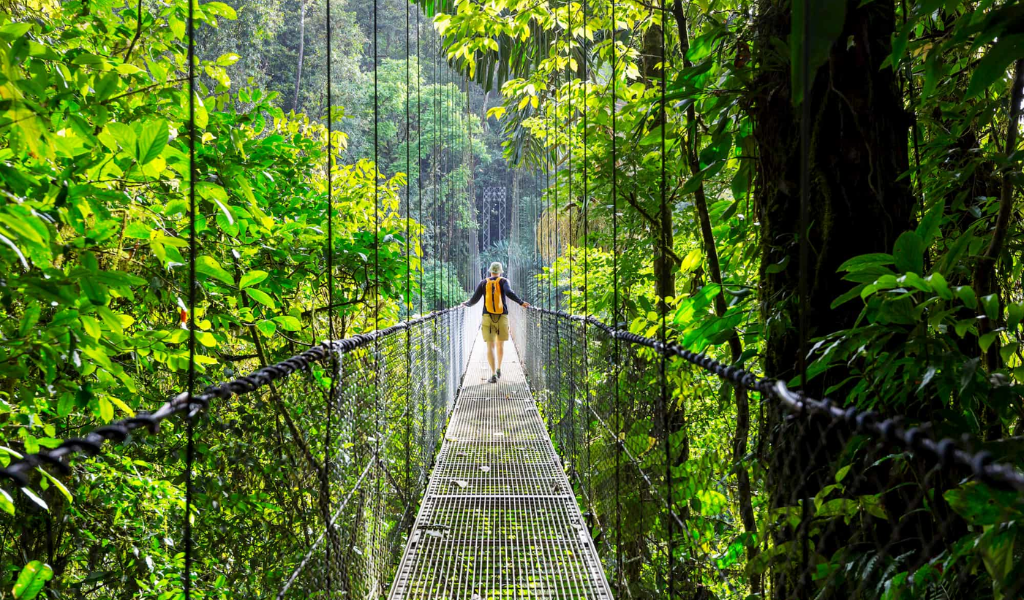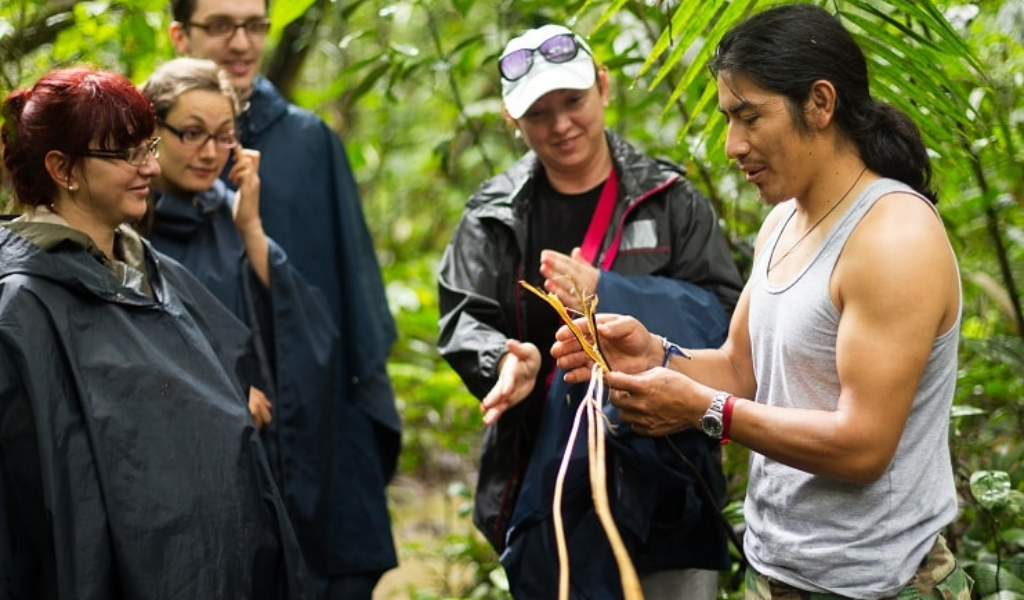In a world where we often hear about the environment and the economy conflicting, there’s a bright spot called ecotourism. That’s what we’ll discuss in this article: the benefit of ecotourism and what tips you can follow to practice this concept.
To help you follow our talk easier, let’s first start with the basics:
What Is Ecotourism?
According to the International Ecotourism Society (TIES), ecotourism is “responsible travel to natural areas that conserves the environment, sustains the well-being of the local people, and involves interpretation and education” (TIES, 2015).
Ecotourism is a subset of sustainable tourism. It is all about bringing together the goals of protecting nature, supporting local communities, and traveling in a way that doesn’t harm our environment.

To make this happen, people who organize, take part in, and promote ecotourism should follow some vital principles:
- Avoid harm to nature, culture, and the people you meet during your eco-adventures.
- Get to know and respect the environment and the cultures you visit.
- Make sure that both the travelers and the locals have a great time and benefit from the experience.
- Use some of the money you spend on your trip to help protect nature.
- Make sure the money you spend also helps the local people and businesses.
- Create experiences that teach visitors about the places they visit, including the local politics, environment, and society.
- Design, construct, and operate low-impact facilities.
- Recognize and honor the rights and beliefs of the Indigenous People in the area. Work together with them to make their lives better.
By following these principles, ecotourism can be an excellent way to explore the world while taking care of it and helping the people who live there.
Ecotourism Activities
A great example of ecotourism is Intrepid Travel. It is a travel and ecotourism agency that aims to improve the living standards of local communities worldwide. The company works closely with local groups to provide the best travel experiences and helps return money to local communities.
Intrepid Travel offers a variety of eco-tourism options, such as wildlife watching, hiking, camping, etc. They are a certified B corporation, which means they satisfy the highest social and environmental performance standards, transparency, and accountability.

If you are interested in booking an ecotourism trip, visit their website and apply an Intrepid Travel coupon at the Checkout for a discount.
You can do ecotourism in natural places like mountains, forests, or wetlands, but also in historical sites. Choose Costa Rica or the Amazon for a complete experience.
Travelers often visit these areas for an extended time to get a feel for what life is like there. They typically stay in eco-friendly accommodations where they eat locally sourced food and follow knowledgeable tour guides.
For example, hire a local ranger to show you around during an ecotour. These rangers know everything about the place’s land, plants, animals, history, and culture. They will teach you a lot while you have a fun adventure in nature.
See more: Best Time To Visit Amazon Rainforest
Benefit Of Ecotourism
Ecotourism is the game-changer of travel with numerous benefits. Compared to other forms of travel, ecotourists are more aware of how their visit affects the environment and the local community.
In recent years, more and more people are getting into ecotourism. That’s because we’re all becoming more conscious of how our actions can impact the planet. Here is the explanation of “Why is ecotourism important?”
To The Environment

First, let’s talk about how the tourism industry helps the natural environment. This form of tourism has various positive impacts on the natural world, including:
- Conservation of Biodiversity: Ecotourism often occurs in areas rich in biodiversity. By promoting responsible visitation and raising awareness about these ecosystems, ecotourism contributes to their protection. When people know and appreciate the value of these natural beauties, they will be eager to support conservation efforts.
- Habitat Preservation: Many ecotourism ideas aim to minimize their impact on fragile ecosystems. That means carefully planning and managing tourist activities to avoid harming the natural habitats of plants and animals. It helps maintain these habitats for future generations.
- Money for Conservation: When you pay for ecotourism trips, a part of that money often goes into projects to save nature. Entrance fees, tour charges, and other expenses will ensure the ongoing protection of the environment.
- Promotion of Sustainable Practices: Ecotourism encourages sustainable practices in the travel industry. Eco-friendly accommodations, responsible waste management, and efficient transportation options are common in ecotourism destinations, reducing the ecological footprint of travelers.
- Protection of Endangered Species: Many ecotourism tours involve observing rare or endangered species. These often fund research and conservation efforts to preserve these species and their habitats.
- Educational Opportunities: This form of tourism is an excellent platform for telling travelers about environmental issues. By learning about the ecosystems they visit and the challenges, tourists become more informed and motivated to support conservation efforts.
- Reduced Pressure on Overcrowded Tourist Destinations: Ecotourism takes the pressure off crowded tourist spots, which can harm the environment. Also, exploring less-visited natural areas helps protect those busy places from getting damaged.
These benefits of ecotourism to the environment show that this concept can be your first move to celebrate World Tourism Day 2023.
To Local Communities
Ecotourism provides local communities with many benefits that can improve their quality of life. This activity can create jobs for locals in various sectors, including hospitality, transportation, guiding, crafts, etc.
One of the main benefits of ecotourism for local communities is that it creates income for people living there through entrance fees, donations, sales of goods and services, and more. It boosts the local economies in a significant way.
Besides, ecotourism helps local people develop new skills and capacities to enhance their employability and entrepreneurship.

What’s more? Ecotourism allows locals to have a say in what happens in their area. They get to be part of the decisions about how things should run.
Speaking of culture, ecotourism helps locals share their traditions, values, and beliefs with visitors. It’s a way of keeping their unique identity and heritage alive.
Finally, this concept also brings better things to the community. It can improve healthcare, education, and essential services like clean water and good roads. As a result, people in these areas have a chance to lead healthier and more educated lives.
To The Economic Growth
When people go on ecotourism trips, they spend money on hotels, food, and activities. This money adds up and becomes part of the country’s GDP. It’s a healthy boost to the economy.
But there are even more economic benefits of ecotourism: Many places heavily rely on one or two industries, which can be risky. Ecotourism diversifies the economy by offering an alternative source of income. So, if one industry struggles, the community still has tourism to fall back on.
The increase in ecotourism catches the attention of investors, both from the government and private sectors. They see the growth potential and invest money into making tourism even better. That’s what makes the tourism industry more competitive and grow.
Potential Drawbacks Of Ecotourism

Besides the massive benefit of ecotourism, several disadvantages of ecotourism need to be handled and minimized:
- Overcrowding and Overdevelopment: Sometimes, too many tourists can flood natural areas, causing harm. It makes animals lose their homes, soil and water get polluted, and too much noise. Also, too many visitors will create traffic jams, produce lots of trash, and disturb wildlife.
- Exploitation and Inequality: Sadly, not everyone benefits from ecotourism. Local people may not get their fair share of the money made from tourism. The dispute among locals, mediators, and outsiders might lead to unfair treatment, harassment, or conflicts with tourists or authorities.
- Greenwashing and Selling Out: Some businesses use the term “ecotourism” to attract customers, even if they do not follow its principles properly. They might treat nature and culture like products to be sold, without caring about their true value and importance.
So, while ecotourism is good, it’s crucial to watch out for these negative impacts and ensure that it’s done in a way that truly respects the environment and the people who call these places home.
Should I Choose Ecotourism?
The benefit of ecotourism we shared above has proved that it is an excellent option if you want to travel responsibly, connect with nature, support local communities, and learn about the environment.
However, ecotourism is not for everyone. It requires more time, money, effort, and preparation than other forms of tourism.
Therefore, you should choose ecotourism only if you are willing to follow its principles and ready to embrace its benefits and drawbacks. Remember to research and choose a reputable tour operator for a quality and authentic ecotourism experience.









